Justices Antonin Scalia and Sonia Sotomayor clashed Monday during Supreme Court oral arguments about whether states may require residents to submit proof of citizenship in order to register to vote. The outcome of the case is uncertain as the justices appeared narrowly divided.
The case involves an Arizona law adopted in 2004 that requires proof of citizenship prior to registering to vote (Prop 200). Challengers argue that it should be struck down because it violates a 1993 federal law (the National Voter Registration Act) requiring states to accept a registration form that lets most voters register to vote when renewing their drivers licenses or applying for social services, simply by attesting under oath that they are citizens.
Much as they did weeks ago during arguments over the constitutionality of the Voting Rights Act, the two justices on Monday each led the charge on opposite sides of the case — Scalia for less federal involvement in states’ ability to set their voting laws, and Sotomayor for broad national authority to protect citizens’ right to vote.
Sotomayor’s opening volley began immediately after Arizona Attorney General Thomas C. Horne stepped up to defend his state’s law. She fired off a series of questions, which she would continue asking in different flavors throughout his argument, about inconsistencies between Arizona’s Prop 200 and the NVRA.
“If I see the purpose of the NVRA to simplify registration, how are Arizona’s provisions consistent with that objective and purpose, given that … many people don’t have the documents that Arizona requires?” Sotomayor said. She asked Horne why he thinks Congress would have required states to accept a voter registration form if states can then turn around and require additional information like a passport or birth certificate.
“Why isn’t that just creating another form?” she demanded. Arizona, she said, may object to the fact that proof of citizenship isn’t required, but “that’s what Congress decided.”
“I have a huge difficulty — great difficulty” with Arizona’s view that proof of citizenship would not be a burdensome addition to the NVRA form, Sotomayor said. She argued that voter registration efforts would be damaged by such a requirement, which is exactly what Congress intended to prevent. “I have a real big disconnect with this.”
Scalia set his marker early in the argument, openly lamenting that Arizona did not launch a more sweeping challenge to the validity of the NVRA, arguing that Congress may not prohibit states from seeing proof of the eligibility of a voter prior to registering him or her.
“Why didn’t you challenge the form?” Scalia asked Arizona’s attorney general. “That’s my problem with this. … Why didn’t you do that?”
When Horne responded that that was the decision of his predecessor, not him, Scalia followed up, “Why didn’t he do it?” The audience in the courtroom laughed. Scalia again pressed Horne on whether his predecessor should have asked to include proof of citizenship in the NVRA form.
The conservative jurist wasn’t convinced requiring people to attest under oath was sufficient.
“So it’s under oath — big deal,” Scalia said. “If you’re willing to violate the voting laws, I suppose you’re willing to violate the perjury laws.” He posited that only “a very low number” of voters would be harmed by a requirement to submit proof of citizenship.
Sotomayor and Scalia’s strong, opposing views gave way to one of the lighter moments of the proceedings. Sotomayor remarked that “some of my colleagues” don’t believe in using legislative history in jurisprudence. When Scalia motioned to himself, the audience broke into laughter. “Did he point to himself? she asked. When she finished speaking, Scalia retorted, “Gee, if I believed in legislative history I would find that very persuasive.” More laughter.
Sotomayor received a strong assist from fellow Obama appointee, Justice Elena Kagan, who said Arizona “essentially creates a new set of requirements and a new form.” Scalia was backed by several pointed questions from Justice Samuel Alito to the challengers’ lawyers.
Horne said Arizona is abiding by the form but believes that it’s “not exclusive” in that it does not preclude states from taking additional steps to verify a person’s eligibility to vote. The lawyer for the challengers, Patricia A. Millett, retorted that it would be “an utterly pointless form” if states could supplement it with added burdens. Sri Srinivasan, Deputy U.S. Solicitor General, also argued on behalf of the challengers against Arizona.










